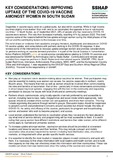| dc.contributor.author | Butler, Nadia | |
| dc.contributor.author | Roldan de Jong, Tamara | |
| dc.contributor.author | Muzzulini, Barbara | |
| dc.contributor.author | Tulloch, Olivia | |
| dc.coverage.spatial | South Sudan | en |
| dc.date.accessioned | 2022-03-11T10:54:01Z | |
| dc.date.available | 2022-03-11T10:54:01Z | |
| dc.date.issued | 2022-03-10 | |
| dc.identifier.citation | Butler, N.; Roldan de Jong, T.; Muzzulini, B. and Tulloch, O. (2022) Key Considerations: Improving Uptake of the COVID-19 Vaccine Amongst Women in South Sudan. Social Science in Humanitarian Action (SSHAP) DOI: 10.19088/SSHAP.2022.006 | en |
| dc.identifier.uri | https://opendocs.ids.ac.uk/opendocs/handle/20.500.12413/17221 | |
| dc.description.abstract | Disparities in vaccine equity exist on a global scale, but also within countries. While in high income countries slightly more women than men tend to be vaccinated, the opposite is true in low income countries. In South Sudan, as of September 2021, 28% of people who had received a COVID-19 vaccine were women. This rate then increased markedly, reaching 41% by January 2022. This brief explores some of the reasons behind the low uptake amongst women during the initial phases of the roll-out and the contributing factors to the increase over time.
This brief draws on evidence from academic and grey literature, dashboards and datasets on COVID-19 vaccine uptake, and consultations with partners working in the COVID-19 response. It also reviews some of the interventions to increase uptake amongst women and provides considerations for partners working on vaccine demand promotion. It is part of the Social Science in Humanitarian Action Platform (SSHAP) series on social science considerations relating to COVID-19 vaccines and was developed for SSHAP by Anthrologica (led by Nadia Butler). Contributions and reviews were provided from response partners in South Sudan and international experts (UNICEF, IFRC, South Sudan Red Cross, Internews, Anthrovisions Productions, WHO, WFP, and the Humanitarian Country Office and Anthrologica). It was requested by the UNICEF East and Southern Africa Regional Office (ESARO). This brief is the responsibility of SSHAP. | en |
| dc.description.abstract | Please note: there is an accompanying infographic summarising the key points from the briefing. | |
| dc.description.sponsorship | Wellcome Trust | en |
| dc.description.sponsorship | FCDO | en |
| dc.language.iso | en | en |
| dc.publisher | SSHAP | en |
| dc.rights.uri | http://creativecommons.org/licenses/by/4.0/ | en |
| dc.subject | Health | en |
| dc.title | Key Considerations: Improving Uptake of the COVID-19 Vaccine Amongst Women in South Sudan | en |
| dc.type | Series paper (non-IDS) | en |
| dc.rights.holder | SSHAP | en |
| dc.identifier.doi | 10.19088/SSHAP.2022.006 | |
| rioxxterms.funder | Default funder | en |
| rioxxterms.identifier.project | Default project | en |
| rioxxterms.version | VoR | en |
| rioxxterms.versionofrecord | 10.19088/SSHAP.2022.006 | en |
| rioxxterms.funder.project | 9ce4e4dc-26e9-4d78-96e9-15e4dcac0642 | en |



